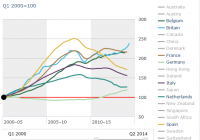Investors Pad The Coffers Of Mutual Funds For The First Week In Three
By Tom Roseen U.S. stocks remained range bound for the fund-flows week ended Wednesday, May 13, 2015. Investors were bombarded by a slew of mixed information that kept them in check. At the beginning of the week investors cheered a better-than-expected first-time jobless claims report that showed layoffs remain at 15-year lows, and they bid the market up further. The Dow Jones Industrial Average posted its strongest one-day point gain in more than three months after nonfarm payrolls data showed a “Goldilocks” scenario that was neither too hot nor too cold. For April the U.S. economy added 223,000 jobs (slightly lower than analysts’ expectations) but far more sanguine than March’s report. The unemployment rate dropped to 5.4% (its lowest level since May 2008), in line with expectations. While the jobs number took some of the funk off the disappointing Q1 2015 GDP number, investors cooled their market enthusiasm for the remainder of the flows week. Despite the positive news of the People’s Bank of China cutting interest rates for the third time in six months, investors appeared weary of the ongoing Greece bailout talks. European stocks fell a bit as investors worried Greece could run out of money in just two weeks. A call by San Francisco Fed President John Williams to start hiking interest rates “a bit earlier” caused a few analysts to postulate a possible June rate hike (although many still believe it might not even happen in September). Then, a weak retail sales report kept the markets in neutral at the end of the flows week, despite some promising reports out of Europe showing France’s and Italy’s economies had entered expansionary territory during Q1 2015. For the first week in three fund investors were net purchasers of fund assets (including those of conventional funds and exchange-traded funds [ETFs]), injecting $1.3 billion for the week ended May 13. Investors were generally purchasers of long-term assets, injecting some $3.7 billion into equity funds and $2.7 billion into taxable fixed income funds. However, for the second consecutive week in a row municipal bond funds suffered net redemptions, handing back some $0.2 billion. Also, for the sixth week in seven money market funds witnessed net redemptions-to the tune of $5.0 billion this past week. For the second week in three equity ETFs witnessed net inflows, taking in some $5.2 billion. As a result of a positive nonfarm payrolls report and a slew of good earnings reports during the week, authorized participants (APs) were net purchasers of domestic equity funds (+$4.5 billion), injecting money into the group for the first week in seven. As result of some nervousness over Greece’s bailout talks and maybe a hint of desperation out of China (after its third rate cut in six months), APs-while still being net purchasers of nondomestic equity funds-injected their smallest amount of new money into the group in 14 weeks, to the tune of just $0.6 billion for this past week. As might be expected with interest turning toward domestic issues, the SPDR S&P 500 ETF (NYSEARCA: SPY ) (+$3.7 billion) attracted the largest net draw of all the individual ETFs. The iShares Russell 2000 ETF (NYSEARCA: IWM ) (+$0.6 billion) and the Health Care Select Sector SPDR ETF (NYSEARCA: XLV ) (+$0.5 billion) took in the next largest amounts of net new money for the week. With APs giving commodity funds and nondomestic equity funds the cold shoulder, it wasn’t surprising to see the SPDR Gold Trust ETF (NYSEARCA: GLD ) suffering the largest net redemptions of the group, handing back $522 million for the week. It was bettered somewhat by the iShares MSCI EMU ETF ‘s (NYSEARCA: EZU ) $464 million and the iShares U.S. Real Estate ETF ‘s (NYSEARCA: IYR ) $199 million of net redemptions. For the third consecutive week conventional fund (ex-ETF) investors were net redeemers of equity funds, withdrawing $1.5 billion from the group. Domestic equity funds, handing back $2.2 billion, witnessed their fifteenth straight week of net outflows, even though they had their first week of plus-side returns (+0.98% this past week) in four. Meanwhile, their nondomestic equity fund counterparts witnessed $0.7 billion of net inflows-attracting new money for the sixth week in a row. On the domestic side investors lightened up on large-cap funds and equity income funds, redeeming a net $1.3 billion and $420 million, respectively, for the week. On the nondomestic side international equity funds witnessed $1.1 billion of net inflows, while the emerging-market equity (+$198 million, taking in the lion’s share), Pacific ex-Japan, Pacific Region, and Japanese fund groups attracted net new money, collectively totaling $237 million. For the eighteenth week in 19 taxable bond funds (ex-ETFs) witnessed net inflows, taking in a little less than $1.8 billion. Flexible income funds attracted the largest sum of new money, taking in a net $0.6 billion (their sixteenth straight week of net inflows), while corporate high-yield debt funds suffered net redemptions, handing back some $115 million-for their fourth week of net outflows in a row. Loan participation funds witnessed net inflows (+$221 million) for the first week in four, while posting their first week of negative returns (-0.06%) in eight. Municipal debt funds (ex-ETFs) witnessed their second straight week of net outflows, to the tune of just $86 million for this past week.
